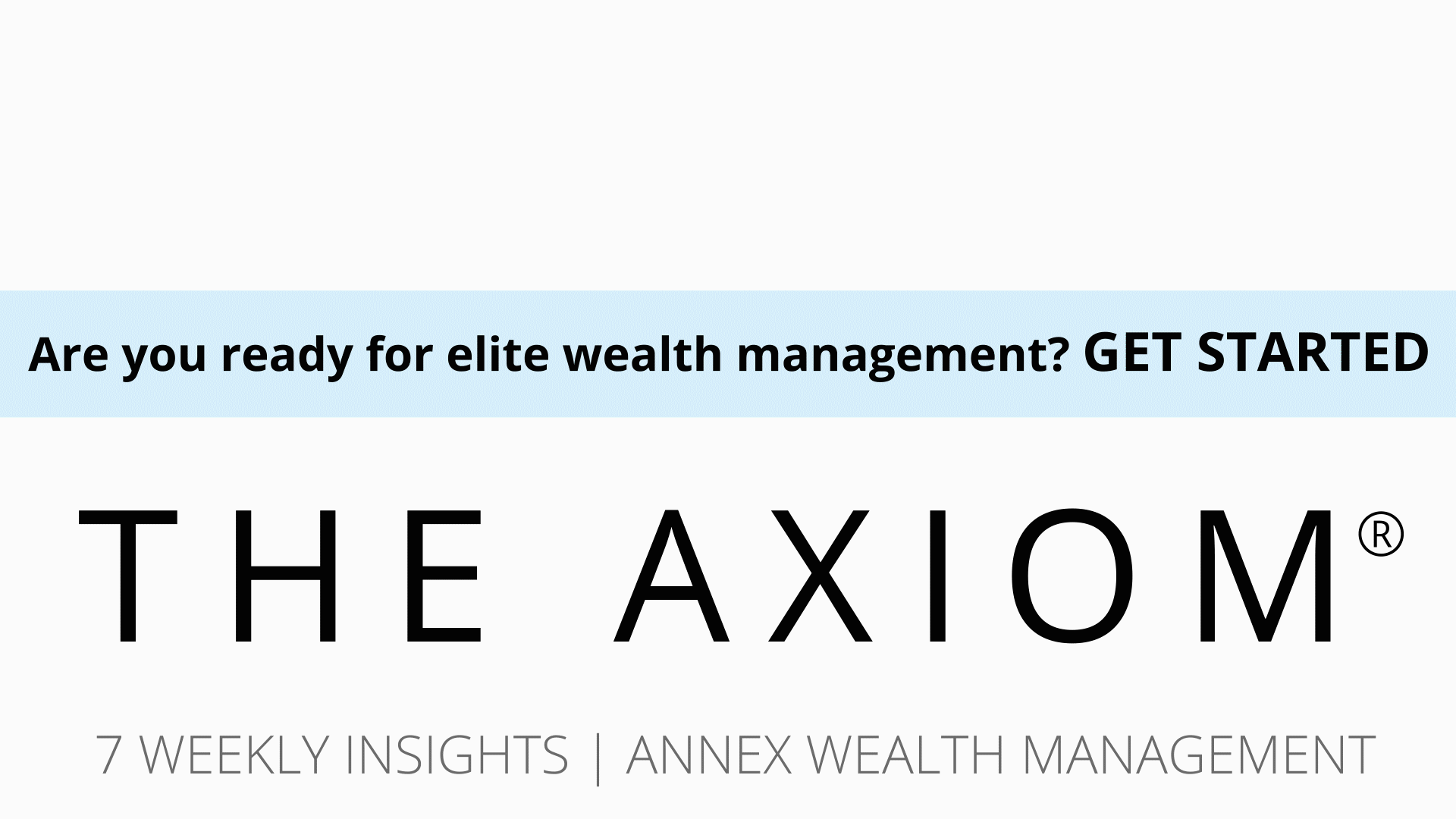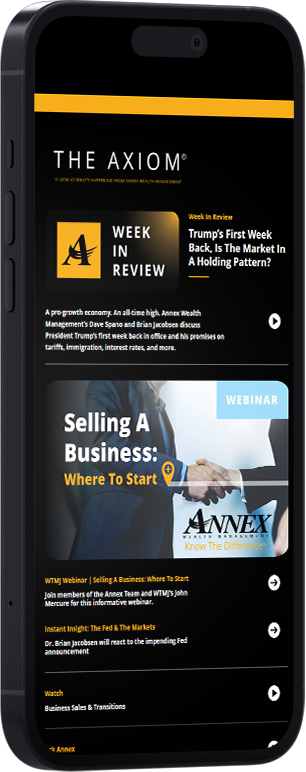
Axiom | Vol 248
Featured: Meet The Axiom’s Guest Editor: Randy Winkler, CFP® | Inside: Markets Reflect An Incredible Comeback – But Will Higher Taxes Affect Earnings? | Poll: Do You Intend On (Or Are You Now) Helping To Pay For Your Grandchild’s College Education? | MoneyDo: Review & Update Your Income Tax Withholding | Ask Annex: My Bank Showed My Stimulus Payment As A Pending Deposit In 2020 – What Tax Year Did I Receive It In? | DYADT: Does Your Advisor Help You Plan Out Your Healthcare If You’re An Early Retiree? | Boeing. Set To Take Off Again? | CEO Survey: Highly Optimistic | What’s That? What’s A Basis Point?
Oops! We could not locate your form.

Meet The Axiom®’s Guest Editor: Randy Winkler, CFP®
I’m Randy Winkler, Annex Wealth Management’s Financial Planning Manager.
I have a dual role at Annex. I oversee a team of Financial Planners who assist our Wealth Managers and clients with various planning concepts such as tax planning, insurance planning, social security, etc. I am also a Wealth Manager and work directly with a number of clients.
My wife and I live in Wauwatosa and enjoy traveling, spending time with family, and exploring the many craft breweries in Southeastern Wisconsin.
BACK TO TOP ↑

What I like best about the Axiom is that it is a weekly look at some of our most popular content from our radio shows. If I miss the show I can still get a glimpse into what’s going on and hear analysis from some of the many Annex subject matter experts.
– Guest Editor: Randy Winkler, CFP® | Financial Planning Manager
________________________________________
Markets Reflect An Incredible Comeback – But Will Higher Taxes Affect Earnings?
The markets seem to show an economy heating up, even as stimulus checks make their way into taxpayers’ accounts. While corporate earnings are healthy, some look at promised and potential tax increases as a headwind for future growth. Annex Wealth Management’s Dave Spano and Derek Felske discuss.
BACK TO TOP ↑

Do You Intend On (Or Are You Now) Helping To Pay For Your Grandchild’s College Education?
The cost of college education continues to climb, and many grandparents are stepping in to help. According to a recent report, this trend is expected to accelerate with baby boomers when they become grandparents and start gifting money since most baby boomers attended college.
Grandparents can also expect tax exemptions and sometimes even credits depending on funding and tuition plans as an extra benefit.
Oops! We could not locate your form.
BACK TO TOP ↑

Review & Update Your Income Tax Withholding
It seems like now more than ever, there are way too many things begging for your attention. You see that little red circle on your phone, and you have to check your incoming messages. TV Stations have crawls of information for you to read while announcers read information. We used to hate call waiting – now you can get a text while you’re on the phone while you receive an incoming e-mail…all while you’re standing in line at the grocery store.
Something as passive as income tax withholding might not get all the attention it deserves. That’s why it made this week’s moneydo.
We talked to our Tax Planning Team and they gave us some great insight.
The Overview
We operate under a “pay as you go” tax system which means both the Federal and State require that you pay income tax throughout the year AS your income is earned. Generally, there are two ways to satisfy your tax liability for any given year.
1. Withholding
2. Quarterly estimates, which are due April, June, September and January.
You’re required to pay in either 100% of the prior year’s taxes (110% if your adjusted gross income (AGI) is over $150,000) or 90% (100% if AGI is over $150,000) of the current year estimated federal liability. Your payments must be made each quarter. This is known as reaching “safe harbor,” and it helps ensure you do not pay any interest or penalties. In addition, each state has their own safe harbor rules.
So, take a few minutes and consider how much you’re withholding for tax from your paycheck. Consider these points:
Withholding:
· If you’ve been receiving a large refund every year when you file your taxes, you may have the ability to withhold less during the year.
· Withholding less will allow access to your funds sooner than waiting for your tax return to be processed and your refund received.
· Conversely, if you find yourself owing taxes every April 15th, you may want to increase your tax withholdings.
· If you’re an employee, you can do increase your tax withholding by adding additional withholding on a W-4.
· If you’re a retired individual, you can increase withholding from taxable retirement distributions or other sources of retirement income.
Life Changes:
· If your filling status changed, make sure you update your withholding amounts, because your tax tables will be changing.
· For example, if you filed “single” in the prior year, and will be filing married in the current year, the tax brackets for which you are taxed on will widen, which might allow more income to be taxed at lower rates. Changes in your life often have an impact on how much you need withheld for the year.
Income Changes:
· When income changes, significantly make sure your withholding elections or estimated payments are still appropriate.
· You may not be required to pay any additional money in during the year, but it will help understand how much could be due come April 15th.
· If your income for the current year is greater than the prior year, and as long as you meet the prior tax year withhold requirements, you do not have to pay the additional tax until you file your return.
Summary:
Have there been any changes from the prior year or where have you over/under withheld in the past? If so, now is the time to adjust your tax withholding or estimated payment amounts.
*Annex Wealth Management does not provide specific tax or legal advice and this information should not be considered as such.
You should always consult your tax or legal advisor regarding your own specific tax/legal situation.
BACK TO TOP ↑

This week’s Ask Annex comes from Jerry, who asks:
“My bank showed my stimulus payment as a pending deposit on 12/31/20. Then it was listed as a deposit on 1/4/21, the first day the bank was ‘open’. Did I receive it during what tax year?”
___________________________
We asked Annex Wealth Management’s Eric Strom, CFP®:
I have good news for you: It doesn’t matter which tax year you received the first two stimulus payments.
The Federal government wants to make sure that you receive any payments for which you are eligible. When you do your 2020 taxes, you will notice a new question that you’ve never seen before. That question concerns the stimulus checks, which you may see referred to as Economic Impact Payments (or EIP for short). You will be asked how much you received for EIP #1 and EIP #2, regardless of which tax year that was. By reporting these amounts, you can reclaim any payments to which you were entitled but that, for whatever reason, you did not receive yet.
The good news continues. Normally, when we receive income, we must be aware of which year we received it. That way, we can report it as taxable income for that year. Luckily, that stimulus payment you received is not considered taxable income. So, you won’t need to report it as such.
I hope this helps put your mind at ease. In a time where we have many things to be concerned about, this is one area where we can rest easy.
BACK TO TOP ↑

Does Your Advisor Help You Plan Out Your Healthcare If You’re An Early Retiree?
For some, the pandemic helped to decide they’d had enough and it was time to retire early. However, since Medicare doesn’t start until age 65 – what does an early retiree do when it comes to health insurance? To answer that question, we turn to Senior Financial Planner, Ron Johnson, CFP®.
BACK TO TOP ↑


KNOW THE DIFFERENCE MINUTE:
Boeing. Set To Take Off Again?
KNOW THE DIFFERENCE MINUTE:
CEO Survey: Highly Optimistic
WHAT’S THAT?
What’s A Basis Point?
BACK TO TOP ↑

Annex Wealth Management provides free workshops, open to the public, on key wealth management topics.
Each week, we provide links to register for upcoming events.
BACK TO TOP ↑






